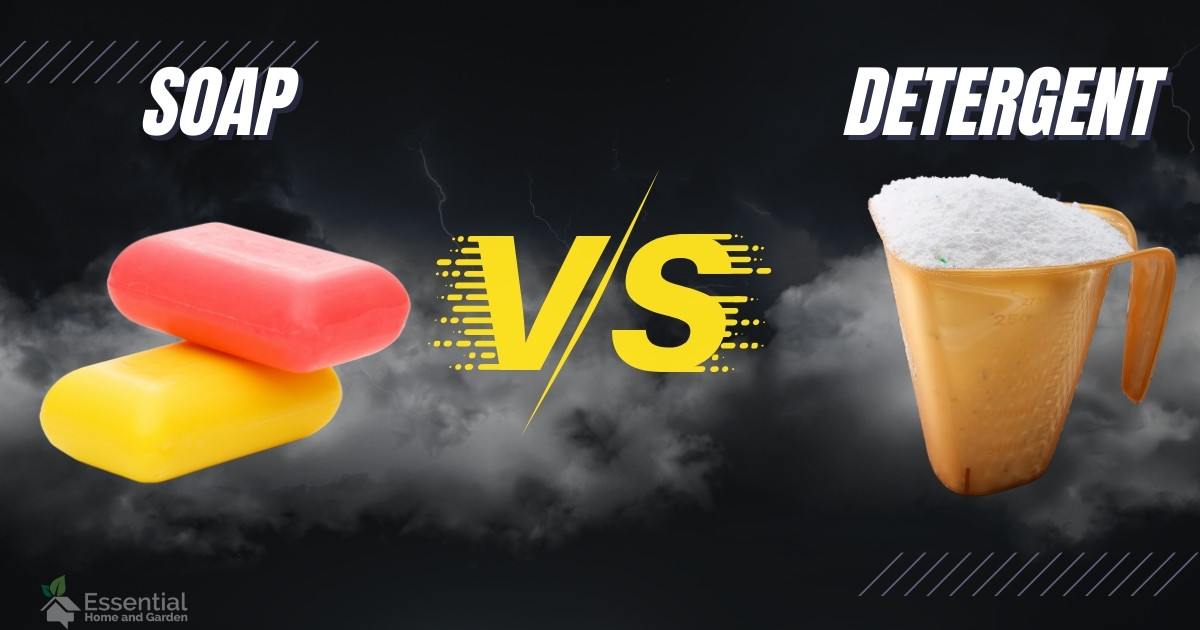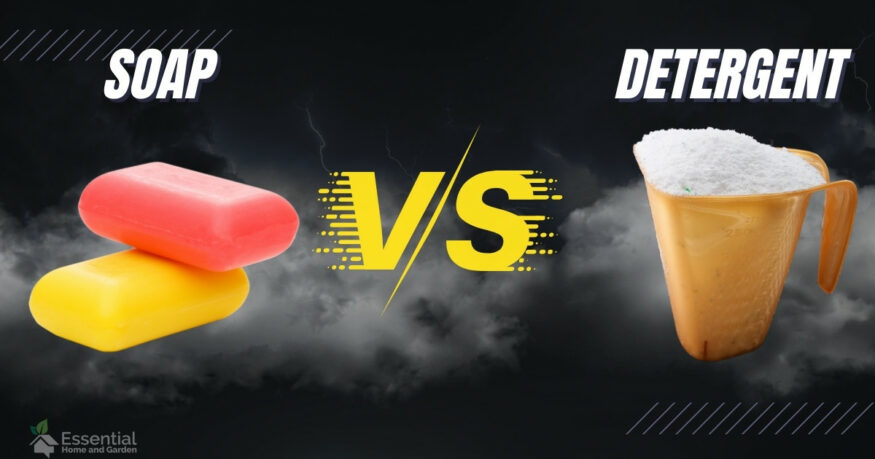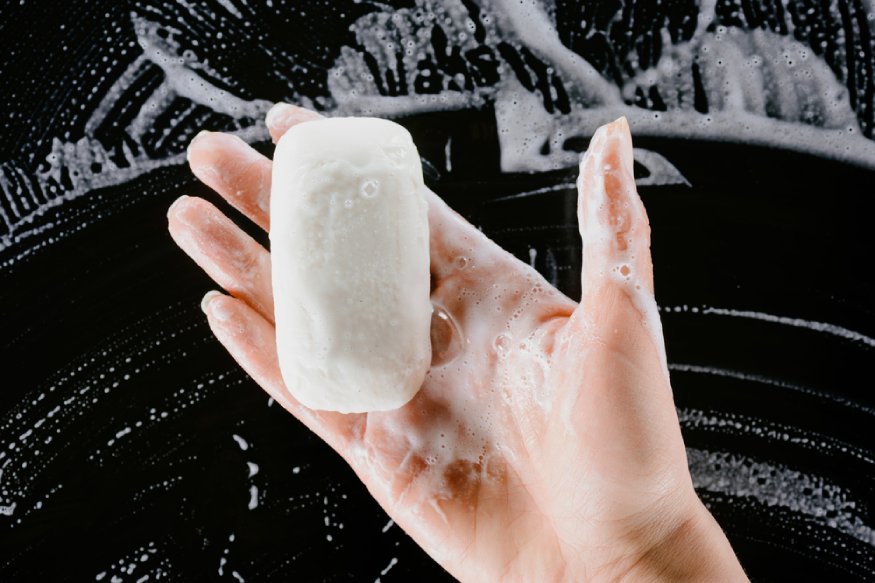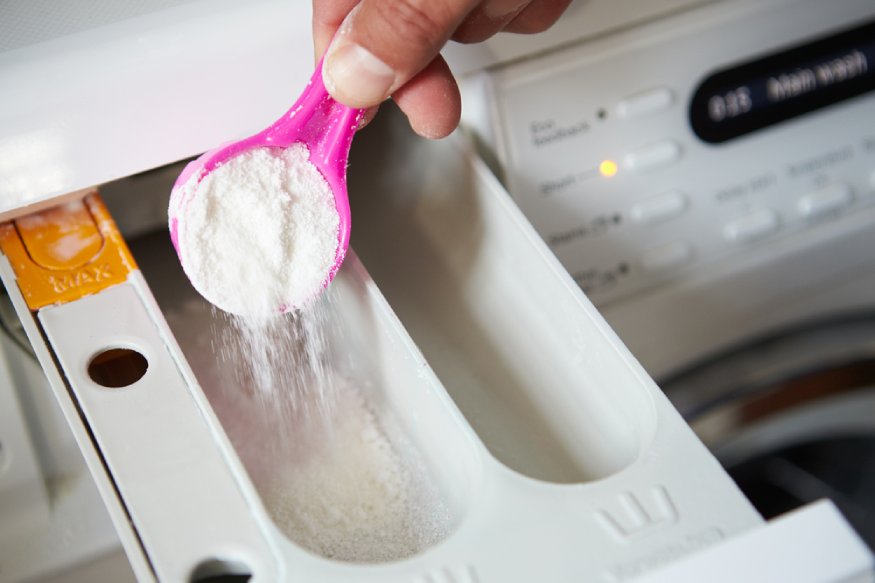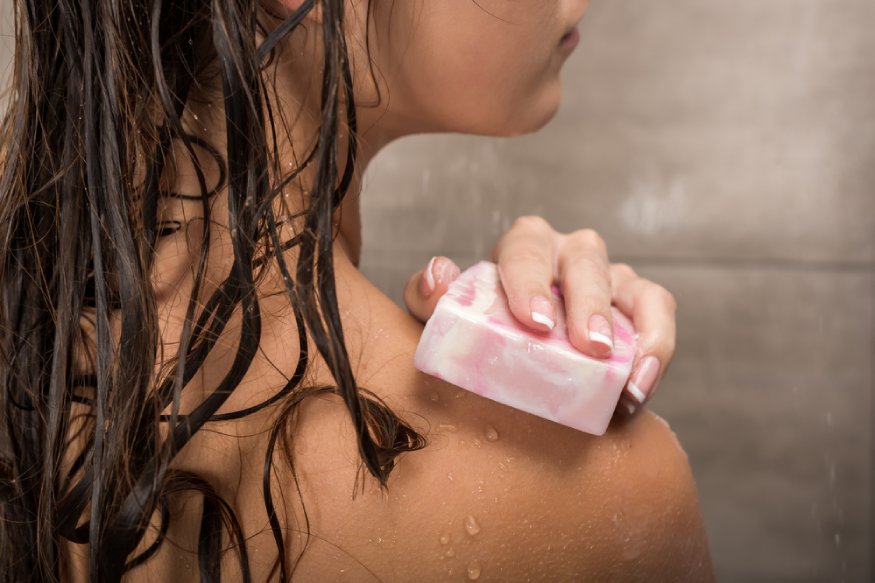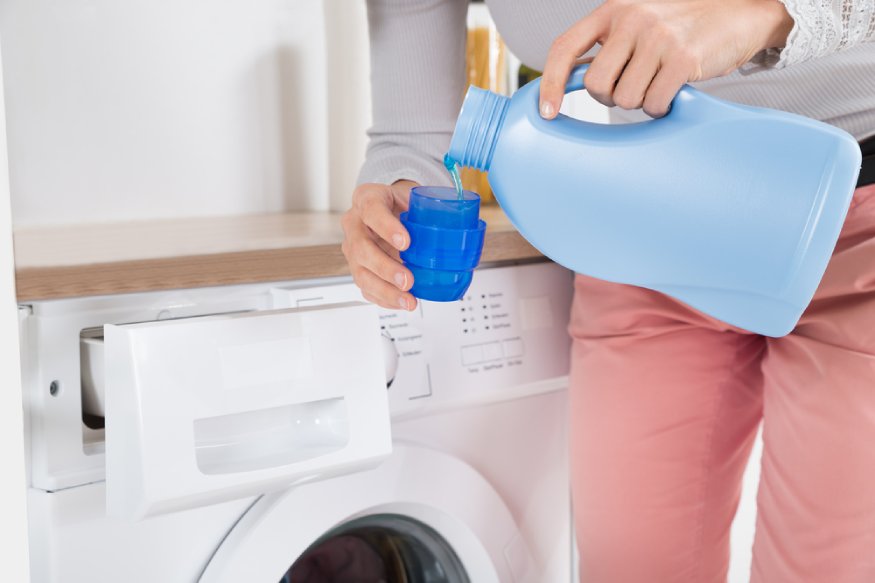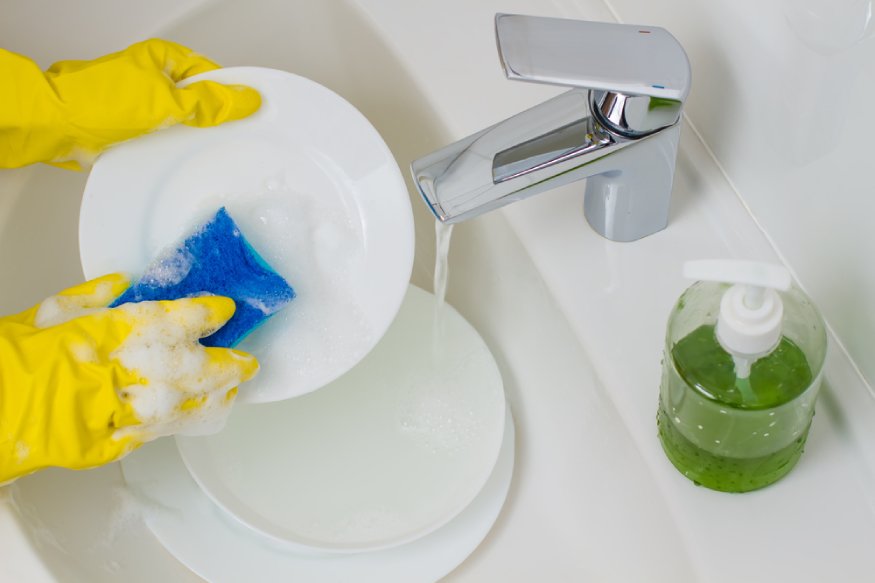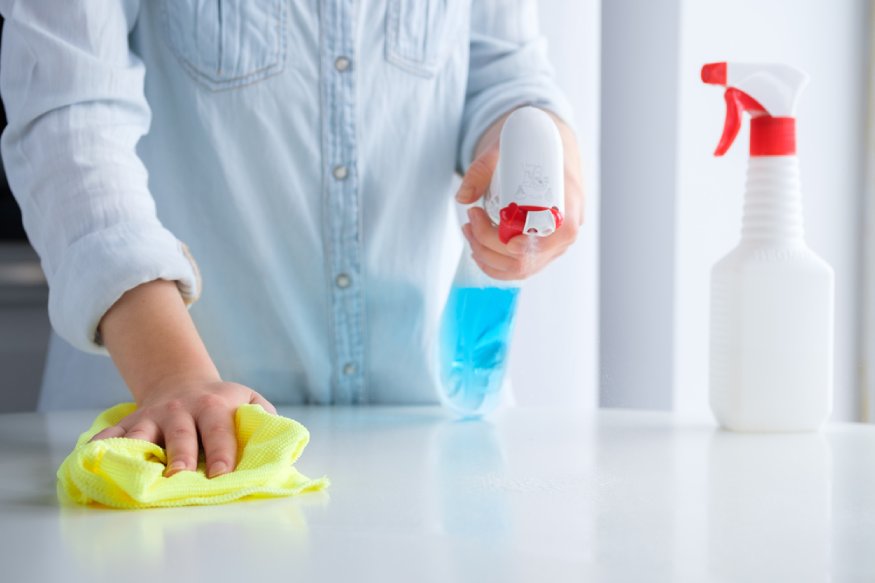While many people use the terms soap and detergent interchangeably, these two cleaning agents are actually different. Understanding how can help you choose the best one for your needs.
The main difference between soap and detergent is in their chemical makeup. Soap consists of oils, fats, and lye that come together to form salts that act as surfactants. Detergents are also surfactant salts, but their unique makeup means they are not reactive with minerals in hard water.
If that difference sounds a little nitpicky, you’ll want to keep reading.
Below, we’ll dive into the more technical aspects that define soap vs detergent. We’ll also talk about the pros and cons of each cleaning agent and when to reach for one over the other. Lastly, we’ll take a look at some of the most common household cleaners and tell you which category they fall into. (Hint: It’s usually not what’s written on the container.)
What Is Soap?
Soap is a salt composed of non-polar hydrocarbon molecules with a polar head. This polar end is made up of a long aliphatic chain, most commonly carboxylate. The polar, or hydrophilic, end binds with water while the non-polar, or hydrophobic, end binds with dirt, grease, and oil.
These characteristics earn soap the designation of being a surfactant—a compound that lowers the surface tension between liquids and solids. And is the reason it is an effective cleaner.
While sodium stearate is the most common form of soap used in products today, there are other compounds that qualify as soaps. All of them are made by combining fats or oils with metal alkali hydroxides, most commonly, lye.
This “saponification” of triglycerides creates the salts we call soap. These triglycerides, or fatty acids, are derived from natural sources of either plant, mineral, or animal origin. Most soaps used today are created using canola, coconut, or palm oil.
What Is Detergent?
Detergent, like soap, is a salt composed of non-polar hydrocarbon molecules with a polar head. Unlike soap, the polar end is made up of a long alkyl chain that is capped with a sulfonate group. This sulfonate group is what allows detergents to be more stable and less reactive in hard water.
Like soaps, detergents are known as surfactants and help lower the surface tension between liquids and solids. They are also effective cleaners and can be even more useful than soap in certain situations. More on that in a bit.
Detergents are manufactured through a variety of chemical reactions. Some involve synthetic chemicals obtained from the refining of petroleum and others are created using oleochemicals derived from plants and animals.
The most common detergents used in household cleaners are alkylbenzene sulfonates, a type of anionic detergent. Other detergent types include cationic, non-ionic, and amphoteric.
Pros and Cons of Soap
Humans have been making and using soap since at least 2800 BC. These first iterations of the product were created by mixing wood ash with animal fat. Today’s soap is a little more complex.
Soap is the go-to for handwashing. That’s because these salts are especially good at breaking down the membrane protecting bacteria while still being gentle on your skin.
Soaps made in the traditional way are typically created using natural ingredients that are biodegradable and safe. These types usually come in solid bar form and are best used for washing the body more so than cleaning your house.
Simple soap can also come in liquid and powder form for use in the laundry, dishwasher, or around the house. But finding soap in this form without added detergents is difficult.
While soap is gentler, more natural, and easier on the earth it does have some downfalls compared to detergent. Most notably, its tendency to react with minerals in hard water creates a white film that can accumulate in your bath, sink, and washer.
Because of this residue, surfaces washed with soap often need an extra rinse.
Pros
- Gentler on the skin
- Typically made from natural ingredients
Cons
- Leaves hard water residue
Pros and Cons of Detergent
Because of that special polar head, detergents do not create soap scum in hard water. This means they wash away more easily and leave the surface looking cleaner.
Since they are specially tailored for cleaning, many detergents offer a stronger cleansing action than soap alone. They can be especially useful for very soiled clothing and to remove set-in stains.
However, detergents are also less likely to be natural. And many are toxic, especially with repeated exposure. They are also not biodegradable and are known to cause damage to aquatic habitats.
Not surprisingly, detergents are not nearly as gentle on the skin as soaps. In sensitive individuals, they can cause allergic reactions. They also tend to burn more than soap when they get in the eyes.
Because of these serious pitfalls, many people seek out “natural” detergent products to use in place of more traditional commercial detergents. In reality, most of these products are actually made of simple soaps, not detergents. But well-crafted natural cleaners, like those offered by Truly Free, are just as effective as detergents.
Pros
- No hard water residue
- Stronger cleansing action
Cons
- Typically made from toxic ingredients
- Not biodegradable
- Less gentle on the skin
Detergent vs Soap Comparison Table
| Soap | Detergent | |
|---|---|---|
| Chemical makeup | Polar carboxylate head connected to non-polar hydrocarbon tail | Polar sulfonate head connected to non-polar hydrocarbon tail |
| Defining feature | Surfactant that reacts with minerals in water | Surfactant that does not react with minerals in water |
| Made by | Combining natural fats and oils with lye | Synthesizing compounds using petrochemicals or natural oleochemicals |
| Benefits | Natural, mild, biodegradable | Deep clean, cheap, no soap scum |
| Drawbacks | Creates soap scum | Can be toxic, not environmentally friendly, can be irritating |
| Used in | Bar soap, some natural “detergents,” added to many commercial laundry detergents | Most liquid soaps, some bar soaps, shampoos, some home cleaning sprays, laundry and dish detergents |
Soap or Detergent? A Look at Common Cleaning Products
Now that you know the differences between detergent and soap, it’s time to take a good hard look at some of the cleaning products in your home. Odds are, the label on the front isn’t as accurate as you would think.
Laundry Cleansers
It would seem obvious that laundry detergents would be made of detergent. But even in regard to the most popular commercial brands, this isn’t the case. At least, not entirely.
Most commercial detergents include a list of ingredients longer than your typical movie credits. Among these are plenty of detergents synthesized from petrochemicals as well as some preservatives, chemical brighteners, and synthetic scents. You’ll also find lipid acids, alkali metal hydroxides, and even fully formed soap salts.
This means that there is no real question of laundry soap vs detergent, as most commercial products contain both.
If you want to avoid those nastier detergents, you can opt for a non-toxic laundry detergent instead. Ironically, most of these are actually made of simple soaps rather than true detergents.
You also have the option of making your own detergent or using any of these laundry detergent alternatives.
Dish Cleansers
While it is true that automatic dishwasher detergents are accurately classified as detergents, as they contain no soap ingredients, detergent chemicals are only a small part of the active cleaning ingredients.
Most of the cleaning powder in dish detergents comes from enzymes and sodas. This plus the fact that they have relatively few detergent ingredients means that they do not sud. Because of the force of the water jets, creating bubbles is unnecessary to remove grime from the surface of the dishware.
While there are fewer detergents, there are still plenty of harsh chemicals in these cleaners that you don’t want to get on your skin. These include bleaches, synthetic fragrances, and alkalies. The latter gives these products a high pH that cuts through grease but is also highly irritating to the skin.
Another common dish cleaner is dish soap. This product, which is generally used to hand wash dishes, isn’t actually soap at all. In fact, the primary active ingredients in these products are almost entirely detergents. This is because detergents work without creating soap scum.
This is especially important during hand washing of plates and glasses to leave them looking and feeling cleaning once they dry. However, compared to detergents used in dishwashers and washing machines, these detergents are fairly mild and made to have a neutral pH so as not to irritate the skin.
Body Cleansers
The one place you are most likely to find true soap in your house is in the bathroom. But even here, you may be surprised by how many detergents you’re using.
If you picked up your hand or body bar soap from the farmers market or natural goods store, odds are high that it is actually real soap. If you got it at the grocery store, you may actually be using a bar filled with synthetic detergents, according to the FDA.
Note: If you’re using liquid hand soap or body wash, then you are almost guaranteed to be using a product that is mostly detergent. This is true even if the bottle says soap.
The FDA regulates products as soap or detergent based on their ingredients, with the latter technically falling into the category of “cosmetics,” not soap. However, they allow companies to label their products as soap regardless of what is actually in the bottle.
Other liquid body cleaners, such as shampoo, are also made with detergents. This overabundance of detergents in the body wash world has everything to do with how cheap they are to manufacture, consumers’ preferences for liquid “soaps,” and the fact that they leave you feeling cleaner because they don’t create soap scum.
Surface Cleansers
As you can probably guess by now, most surface cleaners, such as all-purpose spray and Windex, do not contain soap. Since these products are wiped off rather than rinsed, soap would leave behind an undesirable residue.
Some of these products do use detergents in their makeup. But plenty of others rely on different surfactants to get the job done. And still others rely on non-surfactant ingredients, such as acids, solvents, bleach, and ammonia, to get the job done.
Which Is Better, Soap or Detergent?
Many people are quick to vilify detergents. In some cases, this is warranted.
Plenty of detergents are toxic and have known health effects. They are also much harder on the environment to create and cause problems when they go down the drain. And many products that contain detergents also contain a host of other chemical ingredients you’re better off not having in your home.
But, on the other hand, detergent is very difficult to avoid in the modern world. And some products that utilize these ingredients are made to be milder and contain naturally derived detergents. And, of course, detergents have the benefit of being able to clean more effectively without leaving soap scum.
Still, soaps are a better choice for the environment and are safer for you and your family. For this reason, you should choose soap over detergent when possible.
Using natural bar soap for hand, body, and hair washing is a good start. You can also opt for natural laundry and dish products, like those available from Truly Free, that rely on sodas and simple soaps rather than harsh detergents.
Still have questions about detergents vs soaps or about which is actually in your favorite products? Post your questions below and we’ll get you the answer.
